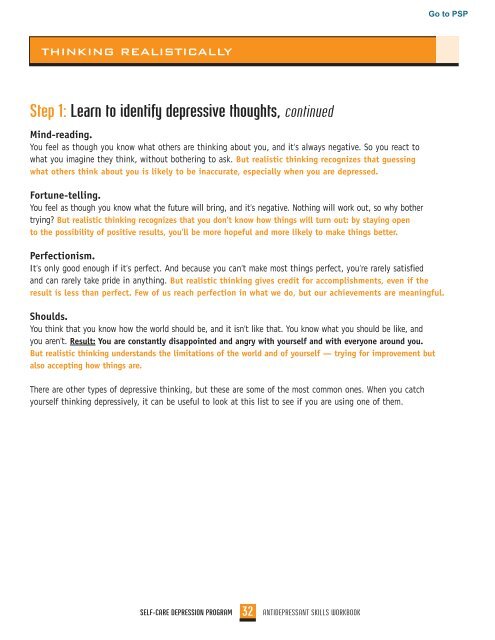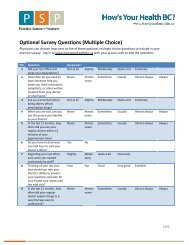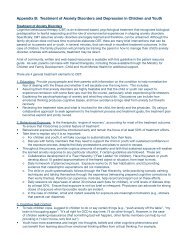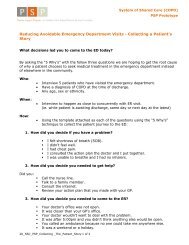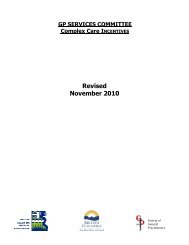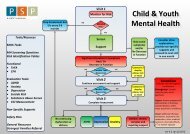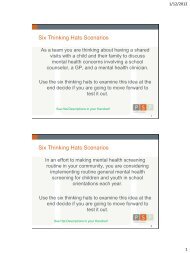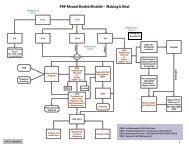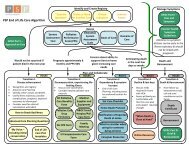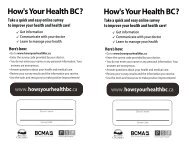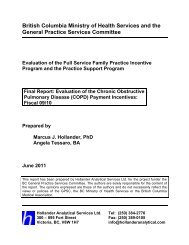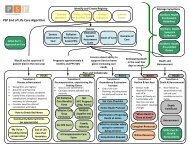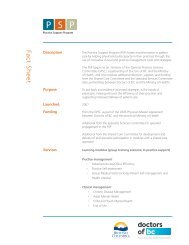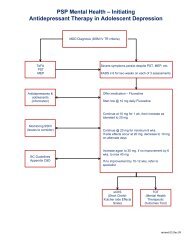- Page 1 and 2:
SteppedCareLevel 1PSP Mental Health
- Page 3 and 4:
Fold back this page before administ
- Page 5 and 6:
CBISCOGNITIVE BEHAVIOURAL INTERPERS
- Page 7 and 8:
Table of ContentsINTRODUCTION. . .
- Page 9 and 10:
Table of contentsIntroductionThe fo
- Page 11 and 12:
Table of contentsTipsTeachingSellin
- Page 13 and 14:
Table of contentsFlow ChartsThis mo
- Page 15 and 16:
Table of contentsPatient NeedsTryTh
- Page 17 and 18:
Table of contentsAnxiousSymptomsTry
- Page 19 and 20:
Table of contentsAssessment ModuleT
- Page 21 and 22:
Table of contents5 Energy levela. H
- Page 23 and 24:
Table of contents15 Phobiasa. Any u
- Page 25 and 26:
Table of contents21 CAGEHow many dr
- Page 27 and 28:
Table of contentsDIAGNOSTIC SCREENI
- Page 29 and 30:
Table of contentsProblem List Actio
- Page 31 and 32:
Table of contentsSelf-Assessment Qu
- Page 33 and 34:
Table of contentsSelf-Assessment Pr
- Page 35 and 36:
Table of contentsSelf-Assessment Pr
- Page 37 and 38:
Table of contentsUnderstanding Depr
- Page 39 and 40:
Table of contentsDepression: System
- Page 41 and 42:
Table of contentsActivation ModuleT
- Page 43 and 44:
Table of contentsDepression’s Ene
- Page 45 and 46:
Table of contentsSmall GoalsThe con
- Page 47 and 48:
Table of contentsProblem SolvingDep
- Page 49 and 50:
Table of contentsChunk the DayStrat
- Page 51 and 52:
Table of contentsAppreciation Exerc
- Page 53 and 54:
Table of contentsThe Circle of Depr
- Page 55 and 56:
Table of contentsCommon Thinking Er
- Page 57 and 58:
Table of contentsTHOUGHT CHANGE PRO
- Page 59 and 60:
Table of contentsThought StoppingDe
- Page 61 and 62:
Table of contentsGood Guilt / Bad G
- Page 63 and 64:
Table of contentsSetting LimitsMost
- Page 65 and 66:
Table of contentsIs Anger a Problem
- Page 67 and 68:
Table of contentsStress ResponseInt
- Page 69 and 70:
Table of contentsVariation - Box Br
- Page 71 and 72:
Table of contentsBody ScanPurpose
- Page 73 and 74:
Table of contentsStress BustersPurp
- Page 75 and 76:
Table of contentsMindfulnessPurpose
- Page 77 and 78:
Table of contentsBreathMINDFULNESS
- Page 79 and 80:
Table of contentsHealthy Habits for
- Page 81 and 82:
Table of contentsIT’S TRUE: YOU A
- Page 83 and 84:
Table of contentsThe Wellness Wheel
- Page 85 and 86:
CBISCognitive Behavioural Interpers
- Page 87 and 88:
FLOW CHARTS……………………
- Page 89 and 90:
PANIC DISORDER• Anxiety “System
- Page 91 and 92:
The Many Faces of AnxietyPanic Diso
- Page 93 and 94:
Medical ConsiderationsMost Common M
- Page 95 and 96:
Anxiety“System-Wide Explosion”A
- Page 97 and 98:
Resources for Self-HelpOnline Resou
- Page 99 and 100:
GAD: Self-Assessment QuestionnaireN
- Page 101 and 102:
GAD: Self-Assessment ProfileHard Dr
- Page 103 and 104:
How Anxiety WorksTHOUGHTSBODYFEELIN
- Page 105 and 106:
Panic CircleEvent (public speaking)
- Page 107 and 108:
Your Emotional Thermometer• Imagi
- Page 109 and 110:
Anxiety EquationAnxiety arises out
- Page 111 and 112:
2. When something bad happens, I wo
- Page 113 and 114:
Coping CardsAnxious people often ma
- Page 115 and 116:
Problem SolvingAnxiety is strengthe
- Page 117 and 118:
Example: Kelly begins by making a l
- Page 119 and 120:
D.E.S.C. ScriptAssertiveness doesn
- Page 121 and 122:
APPLICATION FORPSYCHIATRIC MEDICATI
- Page 123 and 124:
APPENDIX 2: WOMEN’S MENTAL HEALTH
- Page 125 and 126: Pharmacotherapy in the Perinatal Pe
- Page 127 and 128: Pharmacotherapy in the Perinatal Pe
- Page 129 and 130: Pharmacotherapy in the Perinatal Pe
- Page 131 and 132: FAMILY PHYSICIAN GUIDE | ADDRESSING
- Page 133 and 134: Atypical AntipsychoticsClozapine- i
- Page 135 and 136: Approved Use1. schizoaffective diso
- Page 137 and 138: Working with the Suicidal PatientA
- Page 139 and 140: Problem-Solving CapacityCan the pat
- Page 141 and 142: SUPPORTED SELF‐MANAGEMENT FOR DEP
- Page 143 and 144: SELF-CARE DEPRESSION PROGRAM2ND EDI
- Page 145 and 146: INTRODUCTIONDepression is among the
- Page 147 and 148: WHAT IS DEPRESSION?Most times when
- Page 149 and 150: WHAT IS DEPRESSION?A few observatio
- Page 151 and 152: WHAT CAUSES DEPRESSION?SituationDep
- Page 153 and 154: WHAT CAUSES DEPRESSION?Distorted wa
- Page 155 and 156: WHAT CAUSES DEPRESSION?PhysiologyDe
- Page 157 and 158: WHAT CAUSES DEPRESSION?Not doing sm
- Page 159 and 160: WHAT CAN YOU DO ABOUT DEPRESSION?MA
- Page 161 and 162: MORE ABOUT MEDICATIONHere are some
- Page 163 and 164: REACTIVATING YOUR LIFEDuring depres
- Page 165 and 166: REACTIVATING YOUR LIFESelf-CareExam
- Page 167 and 168: REACTIVATING YOUR LIFEInvolvement w
- Page 169 and 170: REACTIVATING YOUR LIFEStep 3: Set r
- Page 171 and 172: REACTIVATING YOUR LIFEStep 3: Set r
- Page 173 and 174: REACTIVATING YOUR LIFEStep 5: Revie
- Page 175: THINKING REALISTICALLYStep 1: Learn
- Page 179 and 180: THINKING REALISTICALLYStep 3: Learn
- Page 181 and 182: THINKING REALISTICALLYStep 4: Pract
- Page 183 and 184: SOLVING PROBLEMS EFFECTIVELYDepress
- Page 185 and 186: SOLVING PROBLEMS EFFECTIVELYStep 2:
- Page 187 and 188: SOLVING PROBLEMS EFFECTIVELYStep 3:
- Page 189 and 190: SOLVING PROBLEMS EFFECTIVELYStep 4:
- Page 191 and 192: SOLVING PROBLEMS EFFECTIVELYStep 6:
- Page 193 and 194: THE ROAD AHEAD:REDUCING THE RISK OF
- Page 195 and 196: REDUCING THE RISK OF RELAPSECreate
- Page 197 and 198: THE STORY OF MARGARETHere is the ex
- Page 199 and 200: SELF-CARE DEPRESSION PROGRAMUSEFUL
- Page 201 and 202: PHYSICAL ACTIVITYRegular physical a
- Page 203 and 204: SLEEPCreate a good sleep environmen
- Page 205 and 206: DRUGS AND ALCOHOLOne of the reasons
- Page 207 and 208: COMING UP WITH REALISTIC THOUGHTSDe
- Page 209 and 210: GOAL SETTINGACTIVITY HOW OFTEN? WHE
- Page 211 and 212: Practice Support ProgramGeneralized
- Page 213 and 214: MONTREAL COGNITIVE ASSESSMENT (MOCA
- Page 215 and 216: 4. Naming:Administration: Beginning
- Page 217 and 218: Scoring: Only the last two item pai
- Page 219 and 220: 4. Time: 30 secondsSpell the word W
- Page 221 and 222: Item 10Sentence WritingCognitive im
- Page 223 and 224: THE MOOD DISORDER QUESTIONNAIREInst
- Page 225 and 226: Practice Support ProgramGlobal Asse
- Page 227 and 228:
Referral Formsfor GPsMental Health
- Page 229 and 230:
REFERRAL FORM: Community MentalHeal
- Page 231 and 232:
CRESST/AFTERHOURS/CAR 67 Referral:C
- Page 233 and 234:
MEDICAL/PHYSICAL/PSYCHIATRIC:Curren
- Page 235 and 236:
Eating Disorders Programs in FH:Fra
- Page 237 and 238:
Current Height:Lowest Wt:Highest Wt
- Page 239 and 240:
Current Treatment for ED /Psychiatr
- Page 241 and 242:
Referral ProcessAll clients referre
- Page 243 and 244:
Current Height:Lowest Wt:Highest Wt
- Page 245 and 246:
Current Treatment for ED /Psychiatr
- Page 247 and 248:
Current Height:Lowest Wt:Highest Wt
- Page 249 and 250:
Current Treatment for ED /Psychiatr
- Page 251 and 252:
:http://www.bcguidelines.ca/pdf/pro
- Page 253 and 254:
Fact SheetObsessive Compulsive Grou
- Page 255 and 256:
Fact SheetDepression Group• The D
- Page 257 and 258:
EPI: Early Psychosis Intervention:T
- Page 259 and 260:
REFERRAL FORMEARLY PSYCHOSIS INTERV
- Page 261 and 262:
FraserhealthHome HealthFor access t
- Page 263 and 264:
ContentsFraser Health Mental Health
- Page 265 and 266:
Fraser Health’scommitmentFraser H
- Page 267 and 268:
ADDICTION SERVICES2. Outpatient/Out
- Page 269 and 270:
ADDICTION SERVICES4. Intensive Day
- Page 271 and 272:
ADDICTION SERVICESSelf-help GroupsS
- Page 273 and 274:
MENTAL HEALTH SERVICES1. Health Pro
- Page 275 and 276:
MENTAL HEALTH SERVICESFraser Valley
- Page 277 and 278:
MENTAL HEALTH SERVICESEarly Psychos
- Page 279 and 280:
MENTAL HEALTH SERVICESAdolescent Da
- Page 281 and 282:
MENTAL HEALTH SERVICESContracted Ag
- Page 283 and 284:
HEALTHY LIFESTYLE ACTION PLAN Cont'
- Page 285 and 286:
This page is intentionally blank an
- Page 287 and 288:
METABOLIC MONITORING FORMMENTAL HEA
- Page 289 and 290:
Diagnostic Criteria and Risk Level
- Page 291 and 292:
Mental Health and Substance Use Rev
- Page 293 and 294:
section 1 - prescriber informationn


